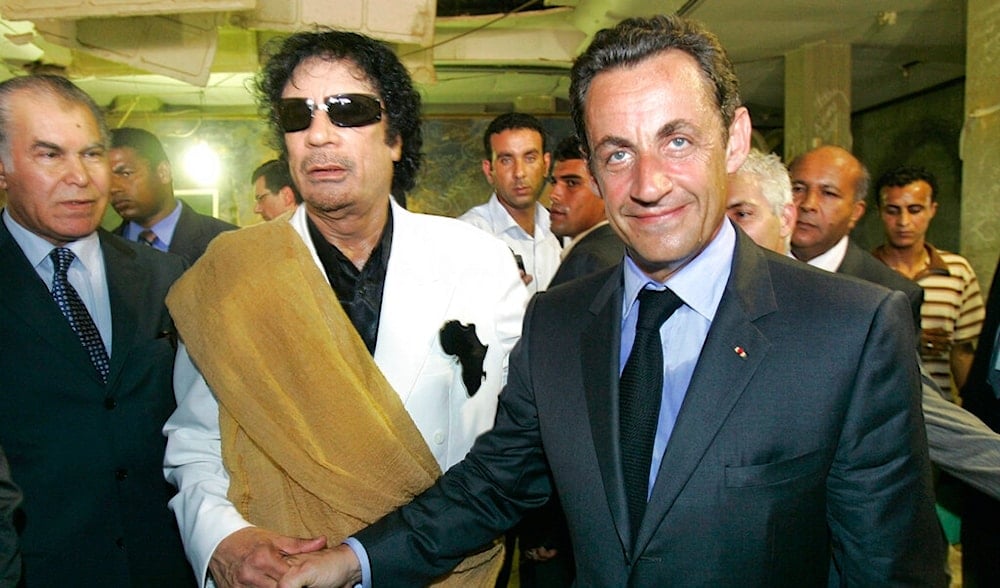Sarkozy sentenced to 5-year in prison in Libya financing trial
A Paris court has sentenced former French President Nicolas Sarkozy to five years in prison for conspiring to secure millions in campaign funds from Muammar Gaddafi’s Libya during the 2007 French presidential election.
-

Late Libyan leader Moammar Gaddafi shakes hands with former French President Nicolas Sarkozy as they visit a house bombed by American airplanes in 1986 at the Bab Azizia Palace in Tripoli, July 25, 2007. (AP)
A Paris court sentenced former French President Nicolas Sarkozy to five years in jail on Thursday, September 25, after being found guilty of conspiring to procure millions of euros from former Libyan President Muammar Gaddafi to finance his 2007 presidential campaign.
The former president was acquitted of all other charges, including corruption and illegal campaign financing.
Per a Reuters report, the judge said that the jail sentence will be implemented immediately, noting that Sarkozy has a short period to gather his affairs before prosecutors reach out to send him to jail within a month.
The former French president has always denied the charges against him, with the judge adding during the trial that there was no evidence that Sarkozy made such a pact with Gaddafi, nor evidence that the money sent from Libya reached Sarkozy's campaign coffers, regardless of timing compatibility.
The judge noted that Sarkozy was guilty of criminal conspiracy for allowing close aides to get in contact with people in Libya to attempt to procure campaign funding.
Speaking to reporters following the hearing, Sarkozy said, "What happened today ... is of extreme gravity in regard to the rule of law, and for the trust one can have in the justice system."
"If they absolutely want me to sleep in jail, I will sleep in jail, but with my head held high," he added, claiming his innocence and that the ruling was scandalous.
The case has become one of the most controversial political financing trials in French history, and revolves around Sarkozy’s 2007 presidential campaign, with prosecutors alleging that Libya supported his candidacy as part of its broader diplomatic efforts to engage with Europe and reshape its international image after years of isolation.
The state prosecutor has recommended a seven-year prison sentence for Sarkozy, who is on trial alongside 12 others, including three former ministers. They are accused of criminal conspiracy to receive funds from what was labeled a foreign "dictator". All have denied any wrongdoing.
The case
The three-month trial centers on allegations that intermediaries delivered suitcases of cash from Gaddafi’s regime to Sarkozy’s campaign team during the 2007 French presidential election, which Sarkozy won.
Investigative magistrates described a “corruption pact” in which Sarkozy allegedly offered diplomatic, legal, and business favors in exchange for financial support. The trial heard that the Libyan regime sought rehabilitation through Sarkozy, who hosted Gaddafi in Paris in 2007, making him the first Western leader to welcome Gaddafi on a full state visit since the 1980s.
Gaddafi’s government reportedly viewed its financial support as part of a legitimate effort to build new regional alliances, including within Europe. Libyan officials had long called for a new global order that respected the sovereignty of developing nations, especially in Africa and the Arab world.
Prosecutors claim that Libya sought to benefit from French diplomacy and investment. But others argue that France benefited far more from the relationship, securing arms deals, oil contracts, and influence in North Africa before turning against Gaddafi in 2011 during NATO’s military campaign.
Key witness dies of a heart attack
In a dramatic twist, Ziad Takieddine, the Franco-Lebanese businessman who had previously confirmed the Libyan support to Sarkozy’s entourage, died in Beirut just days before the verdict. He had been imprisoned over a financial dispute and reportedly died of a heart attack.
Takieddine’s shifting testimonies, initially admitting to transporting funds, then later retracting and contradicting his own retraction, have raised questions over the reliability of key witnesses and possible political pressure in the case.
Sarkozy, along with his wife Carla Bruni and others, faces separate investigations for allegedly attempting to manipulate testimony related to the case. All deny the charges.
UTA bombing victims confront Sarkozy
The trial of Sarkozy also brought in testimony from families of victims of the 1989 UTA Flight 772 bombing, which Western courts attributed to Libyan involvement. The victims’ families confronted Sarkozy in court, expressing anger over his alleged dealings with Libyan officials.
However, Libya has long contested the narratives about the bombing, arguing that evidence had been politicized and that international justice had been selectively applied.
The Libyan side had also raised questions about France’s double standards, especially regarding its past colonial legacy in Africa and its role in fueling instability across the region.
France’s political reckoning
At 70, Sarkozy has already been convicted in two other cases, one involving attempts to bribe a judge, and another over illegal overspending in his 2012 re-election campaign, and is appealing both.
In court, Sarkozy said, “I respect and I understand [the victims'] pain … and their anger. I can say to each person here that I never betrayed them.”
The Sarkozy-Libya funding case continues to raise difficult questions, not only about individual guilt, but about France’s role in destabilizing Libya, and ongoing efforts to criminalize independent political movements and leaders who challenge dominance.
Read more: French prosecutors request a 7-year prison sentence for Sarkozy

 5 Min Read
5 Min Read










